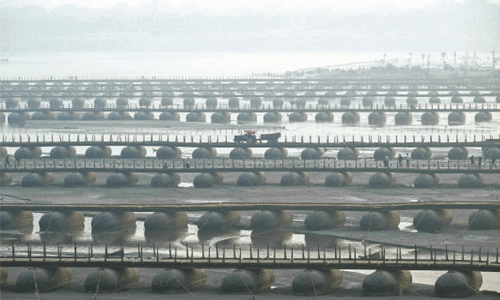• Lack of consultation between police and prosecutors highlighted by top prosecutors of Sindh, Punjab and Balochistan
• Justice Sahito calls for imposing penalty to discourage frivolous litigation
• Justice Adnan questions why prosecutors oppose bail pleas in cases of bailable offences
KARACHI: Experts at a seminar on Tuesday stressed the need of carrying out substantial amendments to the colonial-era Criminal Procedure Code (CrPC) as that would help bring improvements to the criminal justice system.
They were also of the view that a proactive coordination between the investigating officers and prosecutors was essential during the investigation of the cases in order to curb faulty and defective investigation.
They deplored the traditional method of investigation and recommended the use of modern devices as well as proper collection and examination of forensic evidence.
The judges of Sindh High Court and prosecution officials from Sindh, Punjab, Khyber Pakhtunkhwa and Balochistan were speaking at the 19th meeting of Pakistan Prosecution Forum hosted by the Sindh prosecution department in collaboration with United Nations Office on Drugs and Crime and US government here at a local hotel.
Justice Amjad Ali Sahito of the SHC was of the view that the amendments were necessary to change the old laws, including CrPC, in order to bring improvements to the criminal justice system.
While deploring the poor investigation on the part of police, he said that generally, prosecutors and judges were also reluctant to drop the charges at initial stages in the cases where admissible evidence was not available.
Justice Sahito stated that in order to discourage frivolous and false litigation, there must be some deterrence and penalty/fines must be imposed upon the complainants for lodging fake FIRs.
He also suggested various improvements in investigations and said that a forensic vehicle should be available in every district of Sindh to collect evidence from the crime scene.
It is recently witnessed that accused persons were being produced through video link in courts while law suggested that the physical presence of accused was necessary and thus, the requisite amendments were needed to be put in place, he added.
While responding to a question of a prosecutor, Justice Sahito said that if a magistrate/judge did not entertain the scrutiny note, the prosecution may file an appeal before the appellate forum.
Justice Adnan-ul-Karim Memon of the SHC also recommended changes in the laws and said that such changes would empower the prosecutor in respect of the scrutiny of the charge-sheets/investigation reports.
He also questioned the prosecutors as to why they had mostly been opposing the bail applications before the courts in the cases of bailable offences.
Sindh Prosecutor General Dr Faiz Shah said that the century-old laws needed to be replaced or amended properly.
He added that there were some serious issues related to witness protection and limited resources and budget of prosecution department as well as various other grey areas. The pre-trial scrutiny aimed at judging the admissible evidence, he added.
He also underlined the need for proper and proactive consultation with the prosecutors by police from very initial stages of the investigation. He complained that the prosecution could not get the copy of an FIR even after the passage of 24 hours after its registration.
Punjab Prosecutor General Syed Farhad Ali Shah stated that the Prosecution Act was enacted in Punjab in 2006, but necessary amendments had yet to be made in Section 173 of the CrPC as police used to file charge-sheet after six months and it was almost useless for prosecution to scrutinise the same. The changes in Section 173 would empower the prosecution, he added.
Balochistan Prosecutor General Jahanzeb Khan Nassar was of the view that outdated laws must be amended in accordance with the modern era as latest and advanced tactics and devices were being used in investigating the cases across the globe.
He said that the prosecution department of Balochistan had signed a memorandum of understanding with police for coordination in investigations of the cases, but police were functioning only in around 10 per cent areas of the province as the levies forces were operating in the rest of Balochistan and they had yet not inked any such agreement with them.
The secretary of the Punjab public prosecution department, Usman Anwar, stated that while keeping their political interests in view, politicians used to recruit people in police and also responsible for amendments to laws. Therefore, there was a need of judicial reforms as well as to fix the entire system, he added.
The officials of KP prosecution department also spoke on the occasion.
Published in Dawn, July 3rd, 2024















































Dear visitor, the comments section is undergoing an overhaul and will return soon.